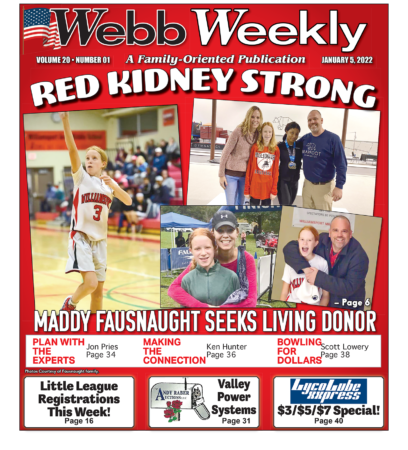Area middle school student, Maddy Fausnaught, was diagnosed with a kidney disease called focal segmental glomerulosclerosis (FSGS), which began at age seven after a bout with pneumonia. FSGS is a type of disease where scarring takes place in small sections of each glomerulus (filter) in the kidneys.
Because the scarred glomeruli cannot be repaired, FSGS is a chronic disease. Treatment can slow the process of kidney disease; however, everyone is different in how they respond to treatment. Over time, some patients with FSGS gradually lose function until they reach kidney failure. If this occurs, those suffering from FSGS require a kidney transplant or dialysis to survive.
Over the past several years, the scarring in Maddy’s kidneys has increased, which has caused her kidney function to drop considerably. She is currently at Stage 4 chronic kidney disease (which is the last stage before kidney failure) and was referred for a pre-emptive kidney transplant. The goal is to get Maddy a transplant before she needs dialysis as it will offer a better outcome. In addition, a live kidney donor would be best because it would reduce her time on the organ transplant list, and there would be no need to wait.
Despite her serious condition, very little slows down this scholar-athlete whose favorite sport is basketball. She also runs cross-country and track. “Doctors are amazed that she still can participate in these sports and have stage 4 chronic kidney disease (CKD). In May of 2021, she broke her L5 vertebrae running track. We didn’t realize it until a few weeks after she mentioned she was in pain. We all just thought it was a pulled muscle,” said mom Karen. All of this shows how tough Maddy truly is. Maddy continued to compete with her injury in the 100 meter, 4×100 meter relay, long jump, and triple jump.
Her injury occurred at the end of track season and ultimately caused her to miss the Altoona Championships for which she qualified. Doctors believe the CKD was the reason for the broken back due to low calcium and Vitamin D levels and Hyperparathyroidism. “Maddy is a fighter. You wouldn’t know it from looking at her that she has Stage 4 kidney disease. She puts on a good show for others. However, at home, the fatigue really sets in,” said Karen.
Certain vitamin and mineral deficiencies are common in children with CKD due to lack of appetite. These deficiencies can also cause extreme fatigue. “It is not uncommon for her to come home from practice, take a shower, and immediately go to bed. All before 6:00 p.m. The fatigue and lack of appetite are her biggest hurdles right now,” said Karen.
To help raise awareness about Maddy’s condition and to help her find a donor match, her family created the Facebook group #RedKidneyStrong. “The Red is for Maddy’s nickname. Since birth, we have called her Red because of her red hair. Kidney Strong because over the past six years, Maddy has proven how tough she really is — countless doctor appointments, 2nd, 3rd, 4th opinions all over the country — Boston Children’s Hospital, National Institute of Health (NIH), Children’s Hospital of Philadelphia, Geisinger, and UPMC. Taking numerous drugs daily, regular blood draws (sometimes weekly depending on her medicines), drug trials, and a broken back. She even spoke at the Capitol Building in Washington, D.C., on behalf of the organization NEPHCURE to advocate for more kidney disease funding. Doing all of this while still attending school, maintaining honor roll status (two grade levels ahead in math), and playing on Williamsport sports teams (cross-country, basketball, track, and field),” said Karen Fausnaught.
“Maddy needs a Type O donor between 18 and 55 years old. Her father and I are not a direct match for Maddy. However, I am participating in the Advanced Donation Program. I am giving one of my kidneys to a man in North Carolina on January 5th at the Hospital at the University of Pennsylvania. In exchange, Maddy will receive a voucher that prioritizes her for a living donor and moves her up in the National Kidney Registry.” Unfortunately, FSGS recurrence after kidney transplantation is a major risk factor for graft loss. Therefore, Maddy may need multiple transplants in her lifetime.
The public can help by sharing Maddy’s story and Facebook group #RedKidneyStrong, where information on becoming a donor and forms needed to start the donor process can be found. For additional information, Karen Fausnaught can also be reached by private messaging through this Facebook group.
Another way people can help is to donate to Camp Kydnie, a non-profit summer camp dedicated to providing one-of-a-kind experiences for children with kidney disease. Every summer during a week in July, children who have kidney disease experience a unique opportunity to meet other children with kidney disease in a safe, supportive and fun environment. Over the past several years, Maddy has attended Camp Kydnie, where she has formed lasting friendships, improved her self-confidence, independence and created special memories that will last a lifetime.




